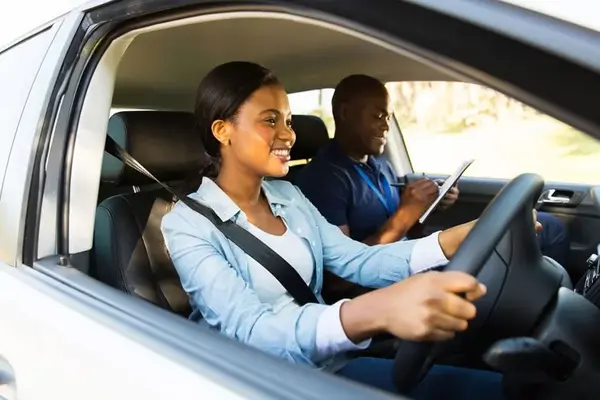Welcome to your journey toward mastering the art of driving and achieving that coveted driver’s license after Driving Test! Whether you’re a nervous novice or someone looking to fine-tune their skills, the road to success begins with mental preparation.
Passing your driving test isn’t just about handling the wheel; it’s about conquering your inner doubts, fears, and uncertainties. In this blog, we’ll take you on a lighthearted yet informative journey to help you mentally prepare for your driving test, British style! After all, a touch of humour can make those challenging driving lessons and nerve-wracking test days a bit more enjoyable.
So, fasten your seatbelts, adjust your mirrors, and let’s set off on the path to behind-the-wheel confidence. It’s time to prepare your mind and ensure that when the big day arrives, you’ll be ready to steer your way to success with a grin on your face. Let’s get started!
Introduction: Mentally Preparing for Your Driving Test
Embarking on the journey toward obtaining your driver’s license is an exciting and often nerve-wracking adventure. The day you step behind the wheel to take your driving test marks a significant milestone, a rite of passage into the world of independence and mobility. It’s a day of mixed emotions—anticipation, excitement, and perhaps a touch of anxiety.
While it’s natural to focus on mastering the practical aspects of driving, there’s another equally critical dimension that often goes overlooked: mental preparation. In this blog, we’ll explore the often underestimated yet vital facet of preparing your mind for the driving test.
Why Mental Preparation Matters
Picture this: you’ve spent weeks, even months, perfecting your parallel parking, mastering the art of merging onto highways, and nailing those three-point turns. You know the road signs like the back of your hand, and you can recite the Highway Code in your sleep. Yet, as you approach the testing centre, your heart starts to race, and your palms get a little clammy.
That’s where mental preparation comes into play. It’s the secret sauce that can transform your test day experience from one filled with anxiety to one infused with confidence. You see, driving is not just a physical skill; it’s a mental game as well. Your state of mind can significantly impact your performance behind the wheel.
When you’re mentally prepared, you’re more likely to stay calm, make rational decisions, and react effectively to unexpected situations on the road. It’s the difference between approaching the test with sweaty palms and approaching it with a composed smile.
Adding a Dash of Humour to the Mix
Now, let’s address the elephant in the car—test anxiety. It’s a common companion on this journey, but it’s one we can learn to laugh at (metaphorically, of course, no laughing while driving!).
Humour has a unique way of diffusing tension and making challenging situations more enjoyable. It’s the driving instructor’s quirky joke that eases your nerves before a lesson or the funny anecdote shared with friends about a particularly memorable maneuver.
Throughout this blog, we’ll sprinkle in a healthy dose of humor to make the process of mentally preparing for your driving test not only informative but also enjoyable. After all, laughter is the best companion on this road to success.
So, fasten your seatbelt, engage your sense of humour, and let’s navigate the winding roads of mental preparation together. By the end of this journey, you’ll be well-equipped to conquer your driving test with confidence and a smile.
Navigating Test Anxiety: Understanding the Common Culprits
As you gear up for your driving test, it’s perfectly normal to feel a flutter of butterflies in your stomach or experience a sudden surge of nervous energy. After all, you’re about to demonstrate your skills in front of an examiner, and the stakes feel high. Let’s dive into some common reasons for test anxiety, how your mental state can influence your performance, and explore relatable anecdotes and statistics that shed light on this widespread phenomenon.
-
Fear of Failure
One of the most prevalent causes of pre-test anxiety is the fear of failure. You’ve invested time, effort, and often a fair amount of money into your driving lessons. The prospect of not passing the test can feel like a setback, a blow to your self-esteem, and a delay in achieving that much-anticipated freedom on the road.
-
Pressure to Perform
The pressure to perform well can also contribute to test anxiety. Whether it’s the expectations of your family, friends, or even your own lofty standards, the weight of performing flawlessly on the test can feel like a heavy burden. It’s like having an audience in the passenger seat, silently judging your every move.
-
Overthinking and Self-Doubt
Overthinking and self-doubt often form a troublesome duo in the lead-up to a driving test. You might find yourself running scenarios of potential mistakes in your mind, questioning your abilities, and dwelling on what could go wrong. This self-imposed mental turmoil can hinder your performance on the actual test day.
The Mind-Driving Connection
Your mental state isn’t just an abstract concept; it can have a tangible impact on your driving performance. When anxiety takes the wheel, it can lead to a range of physical and cognitive reactions that affect your driving abilities. Your heart rate may increase, your focus may waver, and you may become more prone to making errors.
Think of it this way: when your mind is cluttered with worries and doubts, it’s like trying to drive with a foggy windshield. You might not see the road ahead clearly, and your reactions can be delayed or misguided.
Anecdotes
Test anxiety isn’t a unique experience; countless individuals have walked the same path before you. Let’s take a look at a couple of anecdotes and statistics to put things in perspective:
Meet Maryam, a 24-year-old aspiring driver who struggled with test anxiety. She recalls feeling so nervous before her driving test that she accidentally switched on the windshield wipers instead of the turn signal. Despite the hiccup, Sarah passed her test and later laughed about the mix-up with her friends.
Statistic: According to a recent survey by a prominent driving school, approximately 60% of learner drivers reported experiencing some level of anxiety before their driving test. This statistic highlights that you’re not alone in facing this challenge.
Understanding the common triggers of test anxiety and how your mental state can affect your performance is the first step toward conquering it. In the next sections, we’ll explore practical strategies to help you stay calm, confident, and in control on the day of your driving test.
Taming the Pre-Test Butterflies: Strategies for a Confident Mindset
As the day of your driving test approaches, it’s perfectly normal to experience those jittery pre-test nerves. But fret not; there are practical techniques that can help you calm those butterflies and cultivate a confident mindset. In this section, we’ll explore actionable advice to tackle test anxiety head-on, including visualization techniques, breathing exercises, and the power of positive self-talk.
-
Visualisation Techniques
Visualisation is a powerful tool to mentally prepare for your driving test. Close your eyes and imagine yourself sitting confidently behind the wheel, smoothly navigating through traffic, and acing every manoeuvre. Picture the examiner nodding in approval as you effortlessly demonstrate your driving skills.
By repeatedly visualising success, you send a powerful message to your subconscious mind that you can achieve your goals. This can help reduce anxiety and boost your confidence on the big day.
-
Breathing Exercises
Deep breathing exercises are a quick and effective way to calm your nerves. When you’re feeling anxious, your breathing often becomes shallow and rapid. This can further exacerbate feelings of tension and anxiety.
Practice this simple breathing exercise to regain control:
- Find a quiet spot to sit or stand comfortably.
- Inhale deeply through your nose for a count of four.
- Hold your breath for a count of four.
- Exhale slowly through your mouth for a count of six.
- Repeat this process several times until you feel more relaxed.
Deep, controlled breathing can help lower your heart rate and bring a sense of calm. It’s a handy tool to have in your mental preparation toolkit.
-
Positive Self-Talk
Your inner dialogue plays a crucial role in shaping your confidence. Replace self-doubt with positive self-talk. Challenge negative thoughts and replace them with affirmations like:
- “I am well-prepared for this test.”
- “I have practiced and honed my driving skills.”
- “I am a safe and responsible driver.”
By repeating these affirmations, you shift your focus from fear to empowerment. Over time, you’ll build a more resilient and confident mindset.
-
Embrace the Learning Process
Remember that your driving test is just one step in your journey as a driver. Embrace the learning process and view it as an opportunity to improve your skills. Whether you pass or need a retest, each experience on the road will make you a better, more confident driver.
Anecdotes
Anecdote: Meet James, a 20-year-old learner driver who used visualization techniques to overcome his test anxiety. He spent several minutes each day visualizing himself successfully completing various driving maneuvers. On the day of his test, he felt remarkably calm and passed with flying colors.
Statistic: According to a study conducted by a renowned university, learners who practiced positive self-talk and visualization techniques reported a 20% decrease in test-related anxiety and a 15% increase in driving test pass rates. These techniques can have a measurable impact on your performance.
Prepare for the Unexpected: Mock Tests and Simulations
One of the best ways to boost your driving test confidence is to simulate the test experience as closely as possible before the actual day. Mock tests and simulations are invaluable tools in your preparation arsenal. They help you become familiar with the test format, reduce anxiety, and fine-tune your skills.
-
Mock Driving Tests
A mock driving test is essentially a practice run of the actual test. You can arrange one with your driving instructor or a trusted friend or family member. During the mock test, simulate the same conditions you’ll encounter on test day, including the test routes, time constraints, and test procedures.
The benefits of mock driving tests are twofold:
- Familiarity: By experiencing the test format in advance, you’ll feel more at ease when you enter the examination vehicle. This familiarity can reduce anxiety and help you focus on your driving.
- Feedback: Mock tests provide an opportunity for constructive feedback. Your instructor or test partner can identify areas where you need improvement and offer valuable advice for enhancing your performance.
-
Simulated Test Environments
Another effective approach to mentally prepare for your driving test is to practice in simulated test environments. Many driving schools offer this service, where you can take practice tests under conditions similar to the real thing.
These simulations replicate the test centre’s layout, the presence of an examiner, and the specific manoeuvres you’ll need to perform. This immersive experience can help you get comfortable with the test setting, reducing anxiety and boosting your confidence.
Laugh Off the Mistakes: Embracing Imperfection
It’s essential to understand that making mistakes during your driving test doesn’t define your worth as a driver or as an individual. Everyone, from seasoned drivers to newly licensed ones, makes mistakes on the road. The key is to learn from them and keep moving forward.
Humorous Perspective
Here’s a light hearted perspective to consider: think of your driving test as a real-life comedy show. It’s your time to shine as the lead actor in a sitcom filled with unexpected twists and turns. If you make a minor mistake, like stalling the engine or missing a turn, don’t let it ruin the show. Embrace it with a chuckle, reset, and carry on.
Practical Advice
- Stay Calm: If you make a mistake during the test, stay calm and composed. Panicking or dwelling on the error can affect your overall performance. Keep your focus on the road ahead.
- Safety First: Always prioritize safety. If you make a mistake that compromises safety, such as running a red light or failing to yield, your examiner will likely intervene to ensure safety.
- Continuous Improvement: Mistakes are opportunities for growth. After the test, reflect on what went well and what you can improve. Use these insights to become a better driver.
Anecdotes and Statistics
Anecdote: Meet Emma, a 19-year-old learner driver who accidentally turned on the windshield wipers instead of the headlights during her driving test. She chuckled at her own mix-up, corrected it, and continued the test. Her ability to stay composed and laugh off the mistake impressed the examiner, and she passed with only minor deductions.
Statistic: Research shows that examiners often look at how a candidate handles mistakes during the driving test. Remaining calm, acknowledging the error, and taking corrective action can leave a positive impression.
The Night Before: Prepare Your Mind and Gear
The night before your driving test is a crucial time to prepare your mind and gear. Here’s a checklist to ensure you’re mentally and physically ready for the big day:
- Mental Preparation
- Relaxation: Engage in calming activities like reading, listening to soothing music, or practicing deep breathing exercises to ease pre-test jitters.
- Positive Visualization: Spend a few minutes visualizing yourself successfully completing the driving test. Imagine a confident, composed version of yourself at the wheel.
- Affirmations: Recite positive affirmations to boost your confidence and self-esteem. Remind yourself of your capabilities.
- Avoid Last-Minute Cramming: Avoid studying the Highway Code or practicing complex manoeuvres the night before. Trust in the preparation you’ve done leading up to this moment.
-
Gear Preparation
Ensure you have all the necessary documents and equipment ready for the test:
- Provisional License: Don’t forget your provisional driving license; you won’t be able to take the test without it.
- Test Confirmation Letter: If you received a confirmation letter from the driving test centre, bring it with you.
- Glasses or Contact Lenses: If you need corrective eyewear, ensure you have them with you.
- Appropriate Footwear: Wear comfortable, closed-toe shoes that provide good traction.
- Face Mask (if required): Check local guidelines to see if face masks are required during the test.
- Refreshments: Bring a bottle of water and a snack to stay hydrated and energized.
By preparing both your mind and gear the night before, you’ll set yourself up for success and minimize stress on the day of your driving test.
Test Day: Maintaining Confidence and Focus
The big day has arrived, and it’s time to put all your preparation into action. Here are some tips to help you maintain confidence and focus on test day:
-
Start Your Day Right
- Wake Up Early: Give yourself plenty of time to wake up, have a nutritious breakfast, and mentally prepare for the day.
- Review the Basics: Briefly review essential driving concepts in the morning to refresh your memory.
-
Dress Comfortably
Wear comfortable clothing that’s suitable for the weather. Being physically at ease can help you focus better.
-
Stay Calm During the Wait
There might be a waiting period before your test. Use this time to practice deep breathing, review your affirmations, and stay calm.
-
Communicate with Your Examiner
Your examiner is there to assess your skills, not to intimidate you. If you have any questions or need clarification, don’t hesitate to ask politely.
-
Listen Carefully
During the test, pay close attention to the examiner’s instructions. Clarify any doubts before you start driving.
-
Keep a Positive Attitude
Maintain a positive attitude throughout the test. If you make a mistake, don’t dwell on it. Focus on the next task and keep driving safely.
-
Focus on Defensive Driving
Prioritize safety at all times. Demonstrate your commitment to safe driving practices.
-
Don’t Rush
While it’s essential to complete the test within the allotted time, avoid rushing. Drive at a comfortable and safe pace.
-
Post-Test Composure
After the test, maintain your composure, even if you’re uncertain about the outcome. Examiners often observe candidates after the test to evaluate their post-test driving behaviour.
-
Celebrate Your Achievement
Regardless of the outcome, celebrate your achievement of taking the test. Passing is a bonus, but facing the challenge of the test is an accomplishment in itself.
Conclusion
Preparing for your driving test involves more than just mastering driving skills; it’s about cultivating confidence, managing anxiety, and embracing the learning process. By following these strategies, you’ll not only increase your chances of passing the test but also become a safer and more confident driver in the long run. Remember that everyone’s journey is unique, and passing your test is just one step in your lifelong driving adventure. Stay calm, stay focused, and stay safe on the road.






